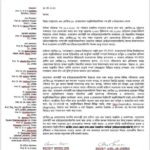 Patients with Type 2 diabetes patient are twice as likely to die from coronavirus – and being obese increases the risk even further, research revealed this week.
Patients with Type 2 diabetes patient are twice as likely to die from coronavirus – and being obese increases the risk even further, research revealed this week.
The study by the NHS and Imperial College London also found that those with Type 1 diabetes –which is not linked to obesity – were three and a half times more likely to die.
The findings provide further evidence that certain groups of patients are at much higher risk of suffering fatal complications.
Lead researcher Professor Jonathan Valabhji, the NHS’s national clinical director for diabetes and obesity, analysed the deaths of 23 804 patients in England from coronavirus between the March 1 and May 11.
Professor Valabhji, also a consultant diabetologist at Imperial College Hospitals, found that 31.4 percent had Type 2 diabetes and 1.5 percent had Type 1.
The study also found that patients with Type 2 diabetes doubled their risk again if they were severely obese, with a body mass index (BMI) above 40.
They were twice as likely to die than those patients with the condition who were in the overweight or normal category. Patients with Type 2 diabetes who also had high blood glucose levels because their condition was poorly controlled increased their risk of death by another 60 percent.
Professor Valabhji said: “This research shows the extent of the risk of coronavirus for people with diabetes and the different risks for those with Type 1 and Type 2 diabetes. Importantly, it also shows that higher blood glucose levels and obesity further increase the risk in both types of diabetes.
“This can be worrying news but we would like to reassure people that the NHS is here for anyone with concerns about diabetes – and has put extra measures in place to help people and keep them safe, including online sites to support people to care for themselves, digital consultations, and a dedicated new helpline for advice and support for people treated with insulin.”
Daily Mail



















